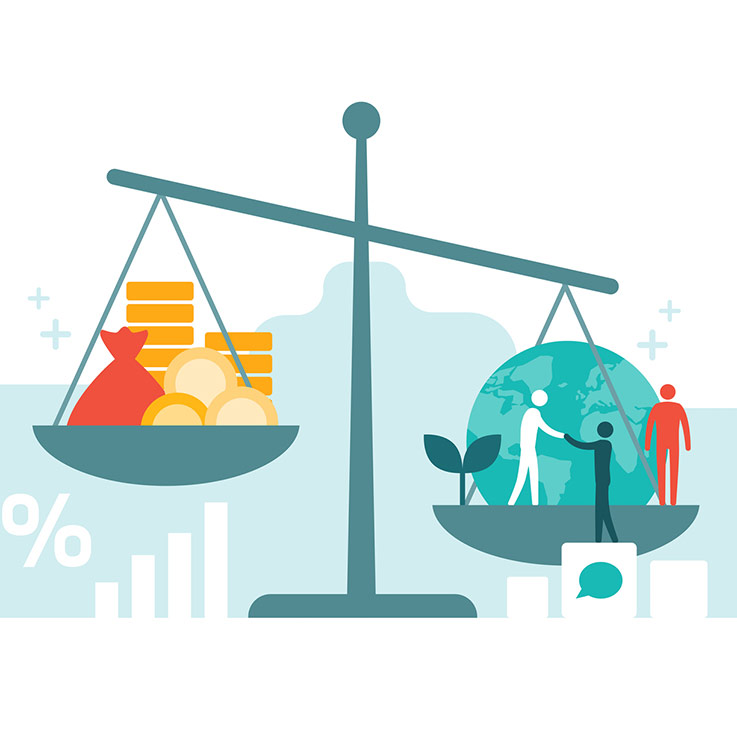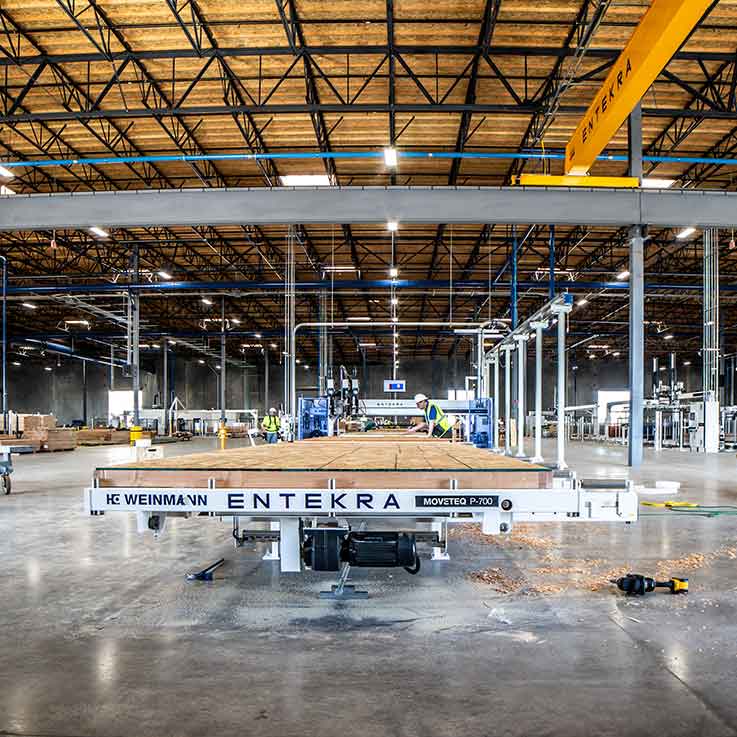
Reconceptualizing the Social Economy
Reconceptualizing the Social Economy
The social economy is increasingly seen as a motor for social change, but how can this shift in perspectives be framed to better understand and harness its potential?
By Gorgi Krlev, Giulio Pasi, Dominika Wruk & Marika Bernhard Apr. 21, 2021
(Illustration by iStock/elenabs)
In Europe, the social economy has traditionally been seen as a way to address market failures, such as the financial exclusion of people living in poverty, or failures of the state, for example finding adequate responses to homelessness. In practice this meant creating welfare organizations, cooperative enterprises, mutual aid societies, civic associations, and the like. These types of organizations continue to play an important role in providing social services, advocating for the most vulnerable groups of society, and contributing to social cohesion and solidarity.
Over the last two decades, however, the development and spread of new organizational forms and models have broadened our conception of what the social economy means. In particular we begin to recognize its role in promoting a green and social transformation that has the principles of inclusion, equity, and responsibility at its heart—principles we must embrace to achieve the sustainable development goals laid out by the United Nations. In this process, the social economy has ceased to be the poor cousin of the market and state, and instead is emerging as an alternative way to think about and organize the economy and even society.
European Perspectives on the Emerging Social EconomyAcademics and scholar practitioners explore how the social economy could transform Europe and the rest of the world.FOLLOW THIS SERIES
Not surprisingly, the social economy relies on two main components: the community, which according to University of Chicago professor Raghuram Rajan too many times has been left behind by markets and the state; and solidarity, which according to European University Institute professors Philipp Genschel and Anton Hemerijck is “the normative expectation of mutual support among the members of large anonymous groups (the class, the party, the nation)… who ought to share one another’s risks and burdens in order to secure the goals and cohesiveness of the group as a whole.”
One can see this transformation of the social economy throughout society, but particularly in the global economic system that is in desperate pursuit of reinventing itself and embracing purpose as its driving force. Today, for example, people see social entrepreneurship less as a particular organizational form and more as a universal method of innovative action aimed at addressing social problems via unconventional approaches. One can also see the transformation in the rapid and pro-social shifts in business models that have occurred in response to challenges provoked by COVID-19, and in the emergence of what some are calling platform cooperativism, which seeks to combine elements of values-based action, open innovation, and digitization to pioneer new ways of conducting business.
Institutional Support for the Social Economy
Several European institutions are promoting this widening understanding of the social economy. The EU Programme for Employment and Social Innovation (EaSI) of the European Commission has had a dual mission, focusing on issues of employment (what might be called the old way of thinking about the social economy) as well as supporting social entrepreneurship, social innovation, and impact finance (reflecting new understandings of the social economy). This approach will be further strengthened when the program becomes a core part of the updated version of the European Social Fund for employment (ESF+).
Furthermore, the European Commission recently announced the vision of “A Strong Social Europe for Just Transitions” in an action plan for the social economy to enhance social investment and social innovation and boost the potential of social enterprises to create jobs, including for those furthest from the labor market. This flagship policy initiative is expected to be adopted in the fourth quarter of 2021.
The European Commission is not alone in trying to strengthen the social economy. This trend is also happening globally. In 2020, the OECD launched the Global Action “Promoting Social and Solidarity Economy Ecosystems,” a project that will include more than 30 countries over three years. The World Economic Forum recently initiated a COVID Response Alliance for Social Entrepreneurs, which seeks to accelerate “breakthrough collaboration” between foundations, business, and the social sector with the aim of breaking down barriers that keep actors in these different pillars detached from each other. And the proposed Green New Deal in the United States seeks a transition to a commercially viable system of sourcing from renewable energy sources, which social movement organizations have long proved is not a wishful utopia but a practical reality.
To explore these trends, we (the authors) helped create the “Social Economy Science Conference,” which was held last November to discuss the social economy in Europe. It attracted more than 800 participants from academia, practice, and policy, and served as a forum to debate current and future ways that the social economy can transform society and the economy. We looked at the subject from three perspectives—the social economy as part of an ecosystem, as an agent of change, and as a partner of policy makers and the for-profit sector. Each of these perspectives is explored below.
Social Economy as an Ecosystem
In recent years systems thinking has grown in popularity as a way for organizations to create social change. These attempts fall short, however, when an engineering mindset is applied, which narrows rather than widens perspectives and aims at implementing incremental rather than more profound changes.
Systems thinking is more effective when people take a broader and more ambitious perspective and use contextual knowledge and attempt to pull the big levers of social change. This type of thinking can be enhanced by looking at the relation between the social economy and broader societal trends such as digitization, the financial markets’ embrace of social impact metrics, and new processes of citizen mobilization such as crowd sourcing.
While business model innovation is taking place, many of the available tools for creating systems change, such as the Social Business Model Canvas, represent mere spin-offs from the commercial world and do not fully embrace social change. Instruments that focus less on individual organizations and instead take a bird’s eye view on social problem solving, such as the European Commission’s Social Economy Canvas, are emerging but are still only available in a beta version. What makes this even more challenging to implement are the rapid changes in digital technology and the exacerbation of social problems, which have increased the speed at which social economy actors need to adapt their strategies.
Open data, digitization, and artificial intelligence offer powerful tools to master these adaptions, but while the tech for social good market is growing, many of these models refer to organizations that also create value for society. Organizational examples where social tech is applied explicitly for more effective social problem solving are much rarer. What may improve the employment of technology for social value creation are large-scale, multi-stakeholder efforts able to initiate open social innovation processes. Unfortunately, tools to promote those efforts, such as citizen hackathons, require substantial resources and may suffer from poor uptake and institutionalization of the developed solutions.
One persistent barrier to taking a systems thinking approach to social problems are the lack of financial resources needed to transfer, diffuse, and scale those solutions. While sustainable and social finance markets such as impact investing are growing, all too often there is a lack of joint and collaborative value creation between impact investors and impact investees. One of the reasons for this is the divergent, or underdeveloped, ideas of how to measure and report social impact, which lead to a mismatch between postulated hopes of contributing to a better world through an impact revolution and the actual effects that are prioritized and achieved.
Social Economy as an Agent of Change
While using a systems lens is an important way to create lasting and deep-rooted change, it is equally important that the social economy develops indirect solutions to problems, which are not always obvious and therefore often ignored. The social economy not only creates necessary improvements to society but can also act as a beacon for others to follow—be it mainstream business actors or policy makers who are prompted to reassess and revise their established practices.
Social enterprises, for example, promote certain principles of organizational structure (like flat hierarchies and decentralization) and organizational practices (like participatory decision-making), and so become ideal testing and breeding grounds for the democratization of work and life in organizations. Social enterprises are also a motor of inclusion. Recent national surveys show that up to 50 percent of social entrepreneurs are female, demonstrating a reality that other sectors only dream of.
The social economy has also created collaborative innovation processes and joint, value-driven action that can serve as a model for others. Take, for example, the bottom-up movement of Catalyst2030 that aims at speeding up systems transformations by using the guiding principle of self-organization. One emergent branch of activities explicitly focuses on harnessing the knowledge of institutions in higher education generated through research and teaching to support capacity building and spillovers to other sectors and arrive at more activities that promise greater progress against the Sustainable Development Goals.
The upcoming European Action Plan on the Social Economy is positioning the social sector as a lighthouse for others to orient at in the post-COVID recovery. Some authors have argued that the social economy is the generative domain in which we find the social values, ethical principles, and solidarity practices that the market and the state should be built upon. Others have used the term to advocate a social shift in our global market economies to be guided more strongly by the principle of solidarity. In fact, accounts of social economy action during the COVID crisis have not only pointed out the shortcomings in the strategic decisions made by the business sector, but also set an example for the latter to follow.
By holding up the principle of solidarity throughout their activities social economy organizations are seen as guardians of inclusive growth as opposed to the more general agenda of smart growth in Western countries. They are also drivers of social innovation processes in developing countries that enable integrated social and economic development, especially by capitalizing on social economy organizations’ strong connections to their target groups.
Social Economy as a Partner
The full potential of the social economy can only be realized if partnerships can be created between social economy organizations, companies, and state organizations. Partnerships are particularly important to mainstream innovative practices to drive the social innovation process forward. While social economy organizations are often the prime initiators of social innovations, they can benefit from the extensive resources of companies and the policymaking and political legitimacy of the state.
National government initiatives such as Le French Impact or Portugal Inovacao Social are using public funds to initiate such partnerships in the hope of producing better outcomes. Social impact bonds serve a similar function, though on a smaller scale, offering the promise of promoting more risky ways of innovating and spurring experimentation in social service provision. Buying social initiatives, which not only advocate for implementing values-oriented criteria in public as well as corporate procurement, but also an orientation at social value creation, point into a similar direction.
Open web platforms that engage a variety of actors not only showcase best practices in the hope that others will pick them up, but also make them available to other actors for joint and collaborative use as well as further development. This approach offers a way to scale up socially innovative approaches more rapidly and broadly than is possible when trying to scale up the work of a single organization.
The Way Forward
Over the coming weeks this series, European Perspectives on the Emerging Social Economy, will present contributions from a variety of European scholars and practitioners on the three perspectives we have put forward here. The authors are not only concerned with analyzing what is currently happening in each of these three areas. These essays also focus explicitly on projecting a future vision for these areas and the strategies that will help the social economy contirbute to shaping a better economy and making society more resilient.










